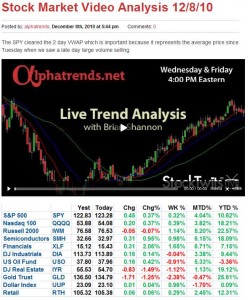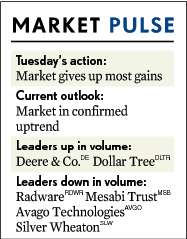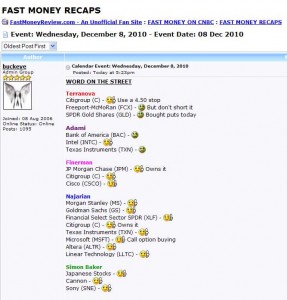Have you ever wondered what sets the best options traders apart from the amateurs? Why is it that certain traders can consistently outperform no matter what the market cycle? Below is a list of the Top 10 Traits Of Successful Option Traders.
They Are Properly Capitalized – A very common mistake for beginner traders is not being properly capitalized. Beginners see the power of leverage option trading offers and think they can turn $2,000 into $20,000 in a matter of weeks. Before they know it, a couple of losing trades have completely wiped out their capital. I must admit I was also guilty of this. I was living in Grand Cayman and had just started options trading. I think in my first 6 months I broke just about every trading rule possible. I had a couple of small positions in the Australian stock market, one a utilities company and the other a REIT (real estate investment trust). Both of these positions had a low beta, meaning that the stocks did not move as much as the general market. So, through lack of knowledge and understanding I thought I would sell some call options on the main ASX index to hedge and protect my long positions. I obviously didn’t understand my net exposure was now hugely short as the short calls easily outweighed my stock holdings. Sure enough the market rallied, I refused to admit my mistake and take my losses and hoped and prayed that the position would come back my way. Next thing you know my capital has been completely wiped out and I had to send money via Western Union and have my brother deposit the money in my account the next day. Not a great experience for me, but one that I certainly learnt from!
They Have A Low Tolerance For Risk – Another important aspect of successful options trading is having a low tolerance for risk. The best options traders will only trade when there is a low risk high reward scenario. They want to have the odds skewed in their favor as far as possible. The best option traders will not try to hit home runs with every trade.
They Trade Only When The Market Provides An Opportunity – One quality all great traders have is patience. Successful investors will only enter into trades when the odds are stacked in their favor. They would much rather be the house rather than the average guy on the street trying to win big. They are focused on the bigger picture and are willing to wait and have the patience to only trade when the right opportunity presents itself. Some of the best traders often talk about sitting idle and just watching the markets, waiting for the perfect time to make a trade. Amateur investors find it very hard to not trade and are captivated by all the red and green numbers on their screen and feel like they are missing out on the action. Can you think of times in your trading when you have experienced this? Are you able to sit on the sidelines and just watch the market without jumping in?
Knowing what cycle the market is in, is key to knowing when to trade and which trades to make. The best resource if have found for knowing what cycle the market is in is Investor’s Business Daily. Each day they publish a Big Picture article which states whether the market is in a confirmed uptrend, the uptrend is under pressure or if he market is in correction. I have found them to be incredibly insightful and you would do well to follow their advice. Their advice is to only buy strong stocks when the market is in a confirmed uptrend and this has been a time tested method for market outperformance. While it’s still possible to make money on the long side while the market is in correction, the odds are stacked against you and you would only want to be buying leading stocks such as those in the IBD 100.
They Have A Trading Plan – Before opening an account, everyone should have a trading plan. This shouldn’t just be something in your head either, you need to write it down! By writing it down, it is clearly defined and you can refer back to it at any time. It will also be more real if you write it down and you’ll be much more likely to stick to it. Like anything in life, in order to be successful you need to have a plan and think things through rather than just flying by the seat of your pants. When I first started trading I would just place random trades based on how I was feeling at the time. I’d put on a bull call spread, then I’d try shorting stocks I thought were over valued and then I’d be making volatility trades. Needless to say I was not very successful during this time. While some of my trades were winners it was like I was taking 1 step forward and 2 steps back. All the great traders have a clearly defined trading plan. This is crucial to your success as a beginner options trader.
They Have A Risk Management Plan – Only trade what you can afford, don’t risk money you can’t afford to lose. Trade defensively, rather than think of what you can make, every time you make a trade you should be thinking about the worst case scenario. What could you lose and how you are going to handle the position if things go badly? Beginner traders have trouble getting a handle on how much to risk on each trade. When starting out you do not want to have 90% of your capital tied up in one trade. One thing for beginner traders to consider is to split your trading capital in half, place half in an interest bearing account and use the rest to trade. This way, no matter what happens, you will never lose all of your capital. Another good risk management rule is to set a fixed percentage of you capital as your risk per trade. A common method would be to set 5% as the maximum capital to risk per trade, but for beginners you could even make that lower. Once a trade is placed you need to continue to monitor risk levels, you can’t just have a set and forget policy, you have to stay on top of your positions and your total portfolio risk. Having a risk management plan is crucial to success as a trader and something that should be done before you start trading. Everyone wants to make a great trade and make lots of money, but you should never take risk management too lightly. What risk management rules fo you have in your trading plan?
They Can Control Emotions – Options trading is an incredibly emotional journey and one that you cannot fully appreciate until you have your own hard earned money on the line. The best traders are able to control their emotions not just when times are bad, but probably even more importantly when times are good. In my experience, and I’m sure this is the same for most traders starting out, some of my biggest losses have come when my confidence has been high. The best traders can keep their ego out of the equation and are able to stay grounded even in the midst of tremendous winning streaks. Also, when one of their trades turns out to be a loser, they are able to admit they were wrong and close out the trade. Great traders never get attached to a trade or a particular stock. A bad trade could turn out to be ok, but sticking to your pre-defined trading rules is crucial. You can be 100% right on a particular trade, but you also need to have the right timing. If your timing is off and your trade breaks your stop-loss you should always stick to your trading rules and keep your emotions out of it.
They Are Incredibly Disciplined – Successful option trading takes a great deal of discipline. Beginner option traders may find it incredibly difficult to just sit and wait for a good opportunity to trade. Waiting for the right opportunities may mean you don’t trade for a while, but trading out of boredom or excitement is one of the worst things you can do.
Having a money management and a risk management plan is one thing, but in order to be a successful trader, you need to have the discipline to stick to it. You also need discipline to stick to the types of trades you are successful with and not start trading strategies that you are not an expert in.
They Are Focused – For beginner options traders it is very easy to get carried away and get excited by all the green P&L numbers on their account statement. Keeping a level head is essential. Staying focused can also be hard when there is so much news on the markets and so many experts, each with a different opinion. The most important thing is to stay focused on your goals, your trading strategy and your rules. Don’t try to copy someone else’s trades or go against your trading rules just because of something Jim Cramer said. Get to know yourself as a trader as well, I have had a few periods when I wasn’t focused and that led to some big losses. I now can recognize those periods and I know those are the times when I really need to refocus my energies and review my trading plan. If you find yourself losing focus, or getting too distracted and stressed with everything going on, it can be a wise move to close out all of your positions and take break for a while. Sometimes that is the best medicine and will allow you to come back with a clear head, more relaxed and more focused.
They Are Committed – Options trading takes a great deal of commitment. Any time you have your hard earned money at risk, you should be trying to get the most out of your investment strategies and controlling your risk. You need to be on top of your game all the time. Any time you stop paying attention to the market, you will get burned. Not only do you need to keep an eye on your trading performance, you need to be staying abreast of the current news, market cycles and investment outlook. Some of the great resources I use, that allow me to keep up to date on the markets and take up the least amount of my time include:
- Alpha Trends – Brain Shannon from Alphatrends.net is a market guru and author of one of the top 10 trading books ever written – “Technical Analysis using Multiple Timeframes”. Brian does a free video analysis of the markets a couple of times a week. In the first 5-10 minutes he goes through the current state of the general stock market and the various market indices. Watching this video only takes a few minutes each week, but you will receive expert analysis on the market from a trader with 17 years experience. Later in the video Brian goes through examples of specific stocks of interest which can be a great source of trading ideas.
- IBD – Investor’s Business Daily is the news service the market pros use. It only takes a minute each day to read their Big Picture article to see what cycle the market is in as well as how the some of the market leading stocks have been performing lately. IBD is listed as the 4th most visited site by Charles Kirk of The Kirk Report.
- Fast Money Review – This is another great site, that only takes 1 minute to review each day. While a lot of the actually show is just hot air coming from the “market gurus”, the Fast Money Review site, gives a very quick overview of what was discussed on the show, by the simple method of placing a smiley face or a frowning face next to the stocks that were discussed and who was discussing them.
If you’re a beginner options trader and find you’re struggling with the commitment required to keep up to date with the market, or find you are suffering from information overload, try these 3 sites out. You will be able to get opinions from multiple experts and it will take you less than 10 minutes a day!
They Have Back Tested Their Strategy – Backtesting is a key part of developing your trading plan. This involves evaluating your trading strategy against the historical performance of the market to check the past performance. Of course past performance does not guarantee future performance, but it will at least give you an idea of how your strategy has performed in different time periods and market conditions. The average investor may not have the capabilities to run these calculations on their own but there are a number of software providers out there that will be able to perform backtesting. In addition, most brokers such as TD Ameritrade have backtesting software that is free to account holders. Backtesting allows you to evaluate the pros and cons of your strategy and also provides scope for improvement or tweaking of the strategy. However, a few things to consider are:
- Make sure you are using an appropriate time period – If you are testing a long only strategy between 1995 and 2000, you are likely to get some very favorable results. The same strategy may not have performed so well between 2007 and 2009. It’s a good idea to test a strategy over a long time period.
- Take into account sectors – If your trading strategy is solely focused on a particular sector, your backtest sample should be taken from that sector. However, in all other cases it is best to use a large sample size from all sectors.
- Take into account commissions – commissions can seriously erode your returns, so you need to adjust for this expense, especially if your strategy involves frequent trading.
- Past performance may not be a good guide to the future – While your chosen strategy may have worked in the past, there is no guarantee it will work in the future. A good idea is to paper trade for a month or two, just to make sure your strategy still works in the current environment.



No comments:
Post a Comment